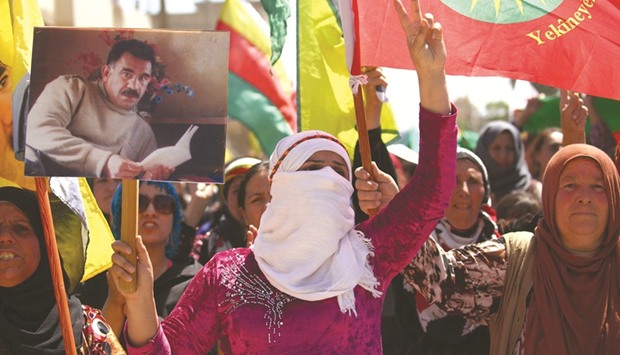Fighting erupted yesterday along Syria’s northeastern border between Turkish forces and Kurdish militiamen, as tensions boiled over in the aftermath of deadly Turkish air strikes the previous day.
The strikes against the Kurdish People’s Protection Units (YPG) have thrown the complexity of Syria’s war into sharp relief and even sparked calls for a no-fly zone in the country’s north.
The skies over northern Syria are increasingly congested, with the Syrian government, Turkey, Russia and the US-led international coalition all carrying out bombing raids across the region.
Tensions escalated further yesterday with cross-border clashes between Turkish forces and the YPG near Darbasiyah, a border town in Syria’s northeast Hasakeh province.
According to the Syrian Observatory for Human Rights, YPG fighters “fired on an armoured vehicle belonging to Turkish forces that had crossed the Syrian-Turkish border.”
Turkey fired a barrage of artillery at the YPG, who returned fire with rockets on Turkish outposts on the border.
There was no immediate information on casualties, said the Observatory’s Rami Abdel Rahman.
YPG spokesman Redur Xelil said Turkey had targeted several areas around Darbasiyah “with heavy artillery and mortar fire.”
“There is sporadic shelling now by the Turkish army and an exchange of fire with some border outposts,” Xelil said.
Ankara has bombed the YPG in northern Syria for months, calling it a “terrorist” group because of its ties to the outlawed Kurdistan Workers’ Party (PKK), which has been waging a deadly insurgency against Turkey since 1984. On Tuesday, Turkish warplanes targeted YPG positions in northeast Syria, killing at least 28 people, according to the Observatory.
Simultaneous Turkish strikes on northern Iraq killed six peshmerga fighters from the autonomous Kurdish government, usually allied with Ankara, in an apparent accident. Hundreds of civilians gathered in northeast Syria yesterday to call for a no-fly zone across the country’s north, echoing a YPG demand in response to Turkey’s deadly bombing raids.
“Only (by) declaring north Syria as a no-fly zone can YPG defend the country unhindered. Turkey must adhere to no-fly zone,” the YPG wrote on Twitter. It posted a series of tweets with the hashtag #NoFlyZone4Rojava, using the Kurdish name for Kurdish-majority parts of northern Syria.
Largescale protests in the Kurdish-majority city of Qamishli saw people carrying YPG flags and holding signs that read “Rojava Demands a No Fly Zone against Turkish aggression”.
“This message is not only for Turkey, it’s for America and the world to stand in the face of this Turkish aggression with a strong position,” said protester Mohamed Mahmoud.
The strikes have underlined the complexities of the battlefields in Iraq and Syria, where twin US-backed offensives are seeking to dislodge IS from its last major urban strongholds.
Yesterday, coalition spokesman US Colonel John Dorrian said Turkey gave the international alliance “less than an hour of notification time before the strikes were conducted, that’s not enough time”.
US forces were operating within 10 kilometres of strikes in northern Iraq where a “significant number” of peshmerga fighters were killed, he said.
Syria’s conflict erupted in 2011 with protests calling for Assad’s ouster but has since evolved into a multi-front war drawing in global powers.
More than 320,000 people have been killed and more than half the population have been forced to flee their homes, including millions who are internally displaced.
Yesterday, air strikes on a displacement camp in northwest Syria killed 10 people, including women and children, the Observatory said.
The Britain-based monitor said it could not specify whether the warplanes that hit the camp near the town of Maarat al-Numan were Syrian or Russian.

A Syrian Kurd carrying a picture of a jailed leader, takes part in a protest in the northeastern Syrian city of Qamishli yesterday, to denounce the raids on Kurdish positions.
